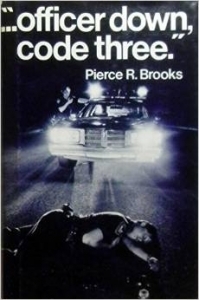The Ten Deadly Errors
Policing is a dangerous job. We’ve all heard that. But why is it considered so dangerous? It’s not that officers are regularly involved in shootouts. Most officers will never fire their gun in the line of duty in their entire career. In fact, most policing is routine patrolling or taking reports or investigating traffic accidents—all pretty innocuous stuff.
What makes policing dangerous is that, at any moment, the officer may be called upon to act, or react, in a life-threatening situation. The routine traffic stop that suddenly turns deadly because the car being stopped for that minor speeding violation is stolen. The stop of a jaywalker — who has just robbed a store and thinks the officer knows about it and is going to arrest him. Policing has been described as ‘hours of boredom punctuated by moments of sheer terror.’
Pierce Brooks’ ground-breaking book
In the late 1960’s, Los Angeles Police Captain Pierce Brooks, who had investigated the notorious ‘Onion Field’ murder of an LA police detective, noticed that there were a small set of errors which led to a large number of police deaths and serious injuries. He compiled his observations in a 1976 book entitled Officer Down — Code Three. These are the ten factors, the ten deadly errors, that Brooks included in his book. These are still being taught in police academies today. They provide some insight into the world of being a street police officer, patrolling in uniform in a marked police car and encountering all manner of circumstances on a daily basis.
The 10 Deadly Errors
1. Lack of Concentration: If you fail to keep your mind on the job while on patrol or carry home problems into the field, you start to make errors. It can cost you and your fellow officers their lives.
2. Tombstone Courage: Just what it says, if time allows wait for backup. There are very few instances where you should try to make a dangerous apprehension unaided.
3. Not Enough Rest: to do your job you must be alert. Lack of sleep or being sleepy can endanger yourself, the community and fellow officers.
4. Taking a Bad Position: Never let anyone you are questioning or about to stop get in a better position than you are. There is no such thing as a routine stop!
5. Not Heeding the Danger Signs: As a cop you will get to recognize ‘danger signs.’ Movements, strange cars, warnings that should alert you to watch your step and approach with caution. Know your beat and watch for what is out-of-place.
6. Failure to Watch the Hands of a Suspect: Is he or she reaching for a weapon or getting to smack you? Where else can a killer strike from, but from their hands? (This has been modified somewhat to include the axiom posited by ‘Mr. Miyagi’ – “Watch eyes. Always watch eyes.”)
7. Relaxing Too Soon: YES, the rut of false alarms are accidental or whatever. Still, observe the activity. Never take any call as routine or just another false alarm. It could be your ass on the line.
8. Improper Handcuffing: Once you have made the arrest, handcuff the prisoner correctly! See that the hands that can kill you are safely secured.
9. No Search or Bad Search: There are too many places to hide a weapon that if you fail to search you are guilty of committing a crime against other officers that will have contact with your prisoner. Many people carry weapons and are able and ready to use them on you. Never assume that the next guy or the jailer will do a ‘good’ search.
10. Dirty or Inoperative Weapon: Is your sidearm clean? How about the bullets? Did you clean your weapon since the last range? Or have you even shot or practiced drawing your weapon recently? Can you hit your target in a combat situation? You must practice faithfully and religiously.
While this list was developed for the safety of police officers, the factors can also provide a starting point for those wishing to write realistic crime novels and short stories. For example, Factor 9 – No search or Bad search – plays a key role in my next book, Proven – An Angela Masters Detective Novel.
The post The Ten Deadly Errors appeared first on Mike Worley - Suspense/Mystery Writer.
Mike Worley's Blog
- Mike Worley's profile
- 9 followers




